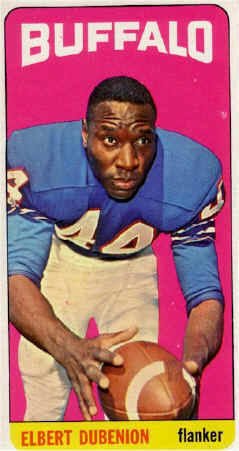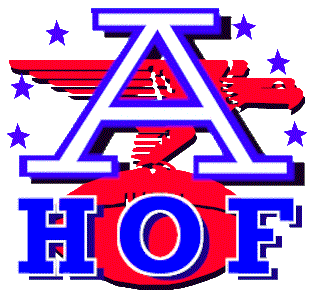|
'Golden Wheels' used to
be Bills' touchdown man
By Erik Brady, The Buffalo News
Published 6:00 a.m. October 2, 2019
If you are a Buffalo Bills fan of a certain age, you
remember Elbert Dubenion as the fleet-of-feet flanker on the Bills’ AFL
title teams of the mid-1960s. Younger fans may know little more than
that his name is on the Bills Wall of Fame.
But know this: His nickname, Golden Wheels, is the best in Buffalo
sports history — and one of the best in all sports history.
This comes to mind because 10 days ago Dawson Knox bulldozed a couple of
Cincinnati Bengals and calls quickly rang out to find a fitting moniker
for the rookie tight end. One suggestion was Rambo, because he wore a
Rambo shirt after that game. Others included Hard Knox and Dawson’s
Freak.
But the one I like is Fort Knox. It conjures images of power and
stolidity, which is good, but harkens to the repository of the nation’s
gold reserves, which is better. That’s because Bills’ nicknames
referencing gold are, well, golden.
Dubenion’s sobriquet, as it happens, comes by way of a left-handed
compliment from a right-handed quarterback. Johnny Green was a backup QB
on the original Bills in 1960 who said of Dubenion: “Man can’t catch,
but he’s got those golden wheels.”
Green wasn’t wrong. Duby — that’s his more prosaic nickname — was a raw
talent with raw speed whose receiving skills were a work in progress.
Through hard work, his hard hands turned into soft ones, catching
hundreds of passes after practice, until he developed into an AFL
All-Star. And in 1964, when the Bills won their first AFL championship,
he had one of the greatest receiving seasons in pro football history.
Dubenion is 86 and now lives in a nursing home on the outskirts of
Columbus, roughly 90 miles from Bluffton, Ohio, where he played
small-college football. His daughter, Carolyn, says he was diagnosed
with Parkinson’s disease in 2007 and no longer is able to speak on the
phone.
But his career speaks volumes.
Duby caught 42 passes in 1964 for 1,139 yards. That’s an otherworldly
average of 27.1 yards per catch, the highest in pro football history
given a minimum of 40 catches. And yet, for all of that, his historical
import cannot be measured by mere numbers.
“He joined the team when the AFL was a shaky league struggling through
its infancy,” reads his bio on the website of the Greater Buffalo Sports
Hall of Fame. “Dubenion was the first great star” in franchise history.
“His exciting play helped the Bills and the AFL become viable.”
Sports Illustrated published a story in November 1962 on the viability
of the AFL when the upstart league was in its third season of
challenging the established NFL. That story includes a photo essay of
seven images of Dubenion returning a kickoff 100 yards for a touchdown
against the Boston Patriots.
“Buffalo is regarded as the best franchise in the AFL,” the SI story
said. “(AFL commissioner Joe) Foss once described it as ‘the pride of
the league,’ and TV broadcasters, using the hyperbole of their trade,
call it ‘the best city in pro football.’ However heady the praise,
Buffalo, hungry for pro football since the All-America Conference
collapsed in 1949, certainly has loyal fans.”
And Dubenion played a leading role in making that so. He was Jack Kemp’s
favorite target in the mid '60s glory years. And Daryle Lamonica liked
him too — Duby caught a 93-yard TD pass from Lamonica in a 1963 playoff
loss to the Patriots that will always stand as the longest postseason
pass in AFL history.
“Duby was our touchdown man,” says Booker Edgerson, a Bills cornerback
in those years. “They loved to throw him the bomb.”
Edgerson figures he became a better player for his years of playing
against Dubenion in practice. “He didn’t have those shake moves to get
open,” Edgerson says. “He could just flat outrun people.”
Carolyn Dubenion says her father often told a joke about that: “He
always said he ran so fast because he didn’t want to get hit.”
Dubenion was born in Griffin, Ga., and he was a small-college
All-America at Bluffton, a Mennonite university that counts Duby,
Phyllis Diller, the late comedian, and Hugh Downs, the late TV
journalist, among its greatest graduates.
Duby was drafted by the NFL’s Cleveland Browns in 1959 but an injury
kept him from trying out and he signed as a free agent with the Bills in
1960. In the first game in franchise history, a 27-3 loss at the New
York Titans, Dubenion dropped several passes and fumbled on a reverse;
he wondered if coach Buster Ramsey might release him.
But the next week, in the first home game in Bills history, Duby caught
TDs of 56 and 53 yards in a 27-21 loss to the Denver Broncos. And by
Week 4, Ramsey told reporters that Dubenion had developed beyond
expectations: “He was green as a gourd when he came to camp and he was a
disappointment in our first game in New York. But he didn’t quit on
himself and he improved 100%. Duby is now a pro.”
Dubenion retired in 1968 with 294 career receptions for 5,294 yards and
35 touchdowns as the last of the original Bills. He wouldn’t be gone for
long.
The next year, Duby returned as a scout. He stayed with the Bills
through 1978 and then, after two years scouting for the Miami Dolphins,
returned to Buffalo. Good thing, too, because he recommended that the
Bills draft a receiver from a lesser-known school in 1985.
“He always made a point of checking out the players from the small
schools,” Duby’s daughter says, “because he was from a small school,
too.”
Yes, the speedy receiver from Bluffton liked a shifty receiver from
Kutztown University — and in the fourth round, the Bills selected their
future Hall of Famer, Andre Reed.
Turns out Golden Wheels — a golden boy of the Bills’ golden years — had
a golden eye for talent. |






